Submitted:
24 April 2023
Posted:
26 April 2023
You are already at the latest version
Abstract
Keywords:
1. Introduction
- -
- Science Education [12–17]
- -
- Language Learning [18],
- -
- Student Training Through M-learning [19]
- -
- Teaching Didactic Planning [20]
- -
- Development of Emotions [21]
- -
- Motivation and School Performance [22]
- -
- The Use of Augmented Reality in Informal Learning Environments [23]
Theoretical Framework
- -
- It is a mixed reality that allows a view of the physical environment accompanied by visualization of interrelated digital components.
- -
- The input is integrated and occurs in real time, i.e., both real and virtual information are delivered in parallel.
- -
- It offers a variety of layers of digital information, allowing the interleaving of different digital elements, such as text, graphics, audio, video, web pages, 3D objects, etc.
- -
- It allows interaction, which means the result of the digital information allows the user to interact with it; for example, 3D objects allow for a variety of options such as the objects being rotated or enlarged, where the animation can even be activated or deactivated. It can improve or change the parts of reality when using techno-logical devices that display additional information seen through the screen. It then requires the users’ mediation for it to take place.
Types of Augmented Reality (AR)
2. Materials and Methods
2.1. Validity
- -
- Internal validity: the analysis of each study included the analysis of the keywords, abstract, article content, methodological approach, and type of research.
- -
- External validity: the studies that lacked validation and discussion of the results were excluded.
- -
- Conclusion validity: the Joanna Briggs Institute evaluation criteria for systematic literature reviews were applied37 in relation to transparency, replicability, quality, and meta-aggregation.
2.2. Inclusion and Exclusion Criteria
- -
- Inclusion criteria: (a) publication period from 2012 to October 2022; (b) articles indexed in Scopus; (c) articles in English; (b) studies related to teacher training for the didactic use of augmented reality (Please refer to Supplementary Information).
- -
- Exclusion criteria: date of publication, type of research (tutorials, essays), and relation to the object of study and the aim of the research.
2.3. Search Indicators
2.4. Data Analysis.
2.5. Information Selection and Representation
Step 4: Data analysis.
3. Results
Q4. Which studies state the reliability and validity obtained in the design and application of the instruments applied?
Q5. Which AR components are mainly used by teachers? At which stage of teacher training were they applied?
- (1)
- Use of 360º videos in AR. Studies based on the use of immersive videos in aug-mented reality
- (2)
- Virtual environments embedded in AR. Studies based on virtual learning envi-ronments and their integration with augmented reality technology
- (3)
- Teacher Digital Competencies. Studies focused on the development of digital teaching skills through the use of augmented reality
- (4)
- Learning Applications for AR. Studies focused on the use of various gaming ap-plications and learning environments, for example, Mobile learning, ubiquitous games
- (5)
- Development or adaptation of new augmented reality technologies. For example, the plugin development (COPIE-STEM protocol)
- (1)
- With markers (e.g., Images, QR, Printed Images)
- (2)
- Without markers
- (3)
- Projection-based
- (4)
- Superimposition-based
- (1)
- Expert (teachers with teaching experience)
- (2)
- Beginner (teachers new to teaching)
- (3)
- Pre-service (teacher training students)
| Classification | Augmented Reality Component (Virtual User Component) | Stage of Teacher Training Subject |
|
| Subject of study | Studies (reference) |
||
| 1 | [75] | 2 | 3 |
| [63] | 2 | 3 | |
| [114] | 1 | 3 | |
| [106] | 1 | 1,2,3 | |
| 2 | [73] | 1 | 3 |
| [69] | 1 | 1,3 | |
| [105] | 1 | 1 | |
| [113] | 1 | 3 | |
| [108] | 1 | 3 | |
| [101] | 3 | 3 | |
| [102] | 2 | 3 | |
| 3 | [91] | 1 | 1,3 |
| [111] | 1 | 3 | |
| [68] | - | 1 | |
| 4 | [49] | 1 | 3 |
| [83] | 1 | 3 | |
| [44] | 1 | 1,3 | |
| [51] | 1 | 3 | |
| [70] | 1 | 3 | |
| [107] | 1 | 3 | |
| [85] | 1 | 3 | |
| [76] | 1 | 1,3 | |
| [86] | 1 | 3 | |
| [43] | 1 | 3 | |
| [77] | 1 | 3 | |
| [87] | 1 | 3 | |
| [110] | 1 | 3 | |
| [109] | 1 | 3 | |
| [78] | 1 | 3 | |
| [79] | 1 | 3 | |
| [80] | 1 | 3 | |
| [88] | 1 | 3 | |
| [89] | 1 | 3 | |
| [81] | 1 | 3 | |
| [90] | 1 | 3 | |
| [91] | 1 | 3 | |
| [92] | 1 | 3 | |
| [41] | 2 | 3 | |
| [93] | 3 | 3 | |
| [84] | 1 | 3 | |
| [48] | 2 | 3 | |
| [94] | 1 | 3 | |
| [82] | 4 | 3 | |
| Classification | Augmented Reality Component (Virtual User Component) | Stage of Teacher Training Subject |
|
| Subject of study | Studies (reference) |
||
| 4 | [54] | 2 | 3 |
| [95] | 1 | 3 | |
| [96] | 1 | 3 | |
| [60] | 2 | 3 | |
| [46] | 2 | 3 | |
| [42] | 1 | 3 | |
| [50] | 1 | 3 | |
| [61] | 1 | 3 | |
| [97] | 1 | 3 | |
| [98] | 4 | 1,3 | |
| [64] | 1 | 3 | |
| [99] | 1 | 3 | |
| [62] | 1 | 3 | |
| [100] | 2 | 3 | |
| [53] | 1 | 2 | |
| [52] | 1 | 3 | |
| [55] | 1,2 | 3 | |
| [47] | 1 | 3 | |
| [65] | 3 | 3 | |
| [66] | 1,3 | 3 | |
| [45] | 1 | 3 | |
| [57] | 1 | 3 | |
| [67] | 1 | 3 | |
| [56] | 1 | 3 | |
| [103] | 1 | 3 | |
| [71] | 1,2 | 3 | |
| [104] | - | 3 | |
| [72] | - | 1 | |
| 5 | [112] | 1 | 3 |
4. Discussion
5. Conclusions
Conflicts of Interest
References
- Zhu, G.; Chen, M. Positioning Preservice Teachers’ Reflections and I-Positions in the Context of Teaching Practicum: A Dialogical-Self Theory Approach. Teach. Teach. Educ. 2022, 117, 103734. [CrossRef]
- Soni, A.; Reyes-Soto, M.; Lynch, P. A Review of the Factors Affecting Children with Disabilities Successful Transition to Early Childhood Care and Primary Education in Sub-Saharan Africa. J. Early Child. Res. 2022, 20, 59–79. [CrossRef]
- Fernández-Batanero, J.-M.; Montenegro-Rueda, M.; Fernández-Cerero, J.; García-Martínez, I. Digital Competences for Teacher Professional Development. Systematic Review. Eur. J. Teach. Educ. 2020, 45, 513–531. [CrossRef]
- Cutri, R.-M.; Mena, J.; Whiting, E.-F. Faculty Readiness for Online Crisis Teaching: Transitioning to Online Teaching during the COVID-19 Pandemic. Eur. J. Teach. Educ. 2020, 43, 523–541. [CrossRef]
- Riofrío-Calderón, G.; Ramírez-Montoya, M.-S. Mediation and Online Learning: Systematic Literature Mapping (2015–2020). Sustainability 2022, 14. [CrossRef]
- Aznar-Díaz, I.; Hinojo-Lucena, F. J.; Cáceres-Reche, M. P.; Trujillo-Torres, J. M.; Romero-Rodríguez, J. M. Environmental Attitudes in Trainee Teachers in Primary Education. The Future of Biodiversity Preservation and Environmental Pollution. Int. J. Environ. Res. Public Health 2019, 16. [CrossRef]
- Estrada-Molina, O. A Systematic Mapping of Variables Studied in Research Related to Education in Informatics and Computing. J. Eng. Educ. Transform. 2022, 36, 109–125. [CrossRef]
- Koutromanos, G.; Jimoyiannis, A. Augmented Reality in Education: Exploring Greek Teachers’ Views and Perceptions. 2022, 31–42. [CrossRef]
- Perifanou, M.; Economides, A.; Nikou, S. Teachers’ Views on Integrating Augmented Reality in Education: Needs, Opportunities, Challenges and Recommendations. Futur. Internet 2022, 15. [CrossRef]
- Chang, H. Y.; Binali, T.; Liang, J. C.; Chiou, G. L.; Cheng, K. H.; Lee, S. W. Y.; Tsai, C. C. Ten Years of Augmented Reality in Education: A Meta-Analysis of (Quasi-) Experimental Studies to Investigate the Impact. Comput. Educ. 2022, 191. [CrossRef]
- López-Belmonte, J.; Moreno-Guerrero, A.; López-Núñez, J.; Hinojo-Lucena, F. Augmented Reality in Education. A Scientific Mapping in Web of Science. Interact. Learn. Environ. 2020. [CrossRef]
- Arici, F.; Yildirim, P.; Caliklar, Ş.; Yilmaz, R. M. Research Trends in the Use of Augmented Reality in Science Education: Content and Bibliometric Mapping Analysis. Comput. Educ. 2019, 142, 103647. [CrossRef]
- Mystakidis, S.; Christopoulos, A.; Pellas, N. A Systematic Mapping Review of Augmented Reality Applications to Support STEM Learning in Higher Education. Educ. Inf. Technol. 2022, 27, 1883–1927. [CrossRef]
- Xu, W.; Ouyang, F. The Application of AI Technologies in STEM Education: A Systematic Review from 2011 to 2021. Int. J. STEM Educ. 2022, 9, 1–20. [CrossRef]
- Lampropoulos, G.; Keramopoulos, E.; Diamantaras, K.; Evangelidis, G. Augmented Reality and Gamification in Education: A Systematic Literature Review of Research, Applications, and Empirical Studies. Appl. Sci. 2022, 12, 6809. [CrossRef]
- Sırakaya, M.; Alsancak-Sırakaya, D. Augmented Reality in STEM Education: A Systematic Review. Interact. Learn. Environ. 2020, 30, 1556–1569. [CrossRef]
- Ibáñez, M. B.; Delgado-Kloos, C. Augmented Reality for STEM Learning: A Systematic Review. Comput. Educ. 2018, 123, 109–123. [CrossRef]
- Parmaxi, A.; Demetriou, A. A. Augmented Reality in Language Learning: A State-of-the-Art Review of 2014–2019. J. Comput. Assist. Learn. 2020, 36, 861–875. [CrossRef]
- (19) Statti, A.; Villegas, S. The Use of Mobile Learning in Grades K–12: A Literature Review of Current Trends and Practices. Peabody J. Educ. 2020, 95, 139–147. [CrossRef]
- Theodoropoulos, A.; Lepouras, G. Augmented Reality and Programming Education: A Systematic Review. Int. J. Child-Computer Interact. 2021, 30, 100335. [CrossRef]
- Gómez-Rios, M. D.; Paredes-Velasco, M.; Hernández-Beleño, R. D.; Fuentes-Pinargote, J. A. Analysis of Emotions in the Use of Augmented Reality Technologies in Education: A Systematic Review. Comput. Appl. Eng. Educ. 2022. [CrossRef]
- Amores-Valencia, A.; Burgos, D.; Branch-Bedoya, J. W. Influence of Motivation and Academic Performance in the Use of Augmented Reality in Education. A Systematic Review. Front. Psychol. 2022, 13. [CrossRef]
- (23) Markouzis, D.; Baziakou, A.; Fesakis, G.; Dimitracopoulou, A. A Systematic Review on Augmented Reality Applications in Informal Learning Environments. Int. J. Mob. Blended Learn. 2022, 14, 1–16. [CrossRef]
- Dubey, P.; Sahu, K. K. Investigating Various Factors That Affect Students’ Adoption Intention to Technology-Enhanced Learning. J. Res. Innov. Teach. Learn. 2022, 15, 110–131. [CrossRef]
- Oliveira, G.; Grenha Teixeira, J.; Torres, A.; Morais, C. An Exploratory Study on the Emergency Remote Education Experience of Higher Education Students and Teachers during the COVID-19 Pandemic. Br. J. Educ. Technol. 2021, 52, 1357–1376. [CrossRef]
- Martins, R. M.; Gresse, C.; Wangenheim, V. Findings on Teaching Machine Learning in High School: A Ten - Year Systematic Literature Review. Informatics Educ. 2022. [CrossRef]
- Garzón, J.; Pavón, J.; Baldiris, S. Systematic Review and Meta-Analysis of Augmented Reality in Educational Settings. Virtual Real. 2019, 23, 447–459. [CrossRef]
- Garzón, J.; Acevedo, J. Meta-Analysis of the Impact of Augmented Reality on Students’ Learning Gains. Educ. Res. Rev. 2019, 27, 244–260. [CrossRef]
- Barroso-Osuna, J.; Gallego Pérez, Ó. Learning Resource Production in Augmented Reality Supported by Education Students [Producción de Recursos de Aprendizaje Apoyados En Realidad Aumentada Por Parte de Estudiantes de Magisterio]. EDMETIC 2017, 6, 23–38. [CrossRef]
- Huertas-Abril, C. A.; Figueroa-Flores, J. F.; Gómez-Parra, M. E.; Rosa-Dávila, E.; Huffman, L. F. Augmented Reality for Esl/Efl and Bilingual Education: An International Comparison. Educ. XX1 2021, 24, 189–208. [CrossRef]
- Badilla-Quintana, M. G.; Sepulveda-Valenzuela, E.; Arias, M. S. Augmented Reality as a Sustainable Technology to Improve Academic Achievement in Students with and without Special Educational Needs. Sustain. 2020, 12. [CrossRef]
- Roig-Vila, R.; Lorenzo-Lledó, A.; Mengual-Andrés, S. Perceived Usefulness of Augmented Reality as a Didactic Resource in the Infant Education Teacher Degree. Campus Virtuales 2019, 8, 19–35.
- Belmonte, J. L.; Sánchez, S. P.; Belmonte, G. L. The Effectiveness of Augmented Reality in Infant Education: A BLS and CPR Learning Study in 5 Year-Old Students. Pixel-Bit, Rev. Medios y Educ. 2019, 157–178. [CrossRef]
- Cabero-Almenara, J.; Barroso-Osuna, J. Learning Ecosystem with «augmented Reality»: Educational Possibilities [Ecosistema de Aprendizaje Con «realidad Aumentada»: Posibilidades Educativas]. Rev. Tecnol. Cienc. y Educ. 2016, 141–154. [CrossRef]
- Sánchez-Serrano, S.; Pedraza-Navarro, I.; Donoso-González, M. How to Conduct a Systematic Review under PRISMA Protocol? Uses and Fundamental Strategies for Its Application in the Educational Field through a Practical Case Study. Bordon. Rev. Pedagog. 2022, 74, 51–66. [CrossRef]
- Page, M. J.; McKenzie, J. E.; Bossuyt, P. M.; Boutron, I.; Hoffmann, T. C.; Mulrow, C. D.; Shamseer, L.; Tetzlaff, J. M.; Akl, E. A.; Brennan, S. E.; Chou, R.; Glanville, J.; Grimshaw, J. M.; Hróbjartsson, A.; Lalu, M. M.; Li, T.; Loder, E. W.; Mayo-Wilson, E.; McDonald, S.; McGuinness, L. A.; Stewart, L. A.; Thomas, J.; Tricco, A. C.; Welch, V. A.; Whiting, P.; Moher, D. The PRISMA 2020 Statement: An Updated Guideline for Reporting Systematic Reviews. BMJ 2021, 372. [CrossRef]
- Lockwood, C.; Munn, Z.; Porritt, K. Qualitative Research Synthesis: Methodological Guidance for Systematic Reviewers Utilizing Meta-Aggregation. Int. J. Evid. Based. Healthc. 2015, 13, 179–187. [CrossRef]
- Estrada-Molina, O.; Fuentes-Cancell, D.-R. Engagement and Desertion in MOOCs: Systematic Review. Comunicar 2022, 30. [CrossRef]
- Tang, W.; Hu, J.; Zhang, H.; Wu, P.; He, H. Kappa Coefficient: A Popular Measure of Rater Agreement. Shanghai Arch. Psychiatry 2015, 27, 62–67. [CrossRef]
- van Eck, N. J.; Waltman, L. Citation-Based Clustering of Publications Using CitNetExplorer and VOSviewer. Scientometrics 2017, 111, 1053–1070. [CrossRef]
- Di Serio, Á.; Ibáñez, M. B.; Kloos, C. D. Impact of an Augmented Reality System on Students’ Motivation for a Visual Art Course. Comput. Educ. 2013, 68, 586–596. [CrossRef]
- Ibáñez, M. B.; Di Serio, Á.; Villarán, D.; Delgado Kloos, C. Experimenting with Electromagnetism Using Augmented Reality: Impact on Flow Student Experience and Educational Effectiveness. Comput. Educ. 2014, 71, 1–13. [CrossRef]
- Chang, S. C.; Hwang, G. J. Impacts of an Augmented Reality-Based Flipped Learning Guiding Approach on Students’ Scientific Project Performance and Perceptions. Comput. Educ. 2018, 125, 226–239. [CrossRef]
- Yilmaz, R. M. Educational Magic Toys Developed with Augmented Reality Technology for Early Childhood Education. Comput. Human Behav. 2016, 54, 240–248. [CrossRef]
- Fonseca, D.; Martí, N.; Redondo, E.; Navarro, I.; Sánchez, A. Relationship between Student Profile, Tool Use, Participation, and Academic Performance with the Use of Augmented Reality Technology for Visualized Architecture Models. Comput. Human Behav. 2014, 31, 434–445. [CrossRef]
- Chiang, T. H. C.; Yang, S. J. H.; Hwang, G. J. Students’ Online Interactive Patterns in Augmented Reality-Based Inquiry Activities. Comput. Educ. 2014, 78, 97–108. [CrossRef]
- Hsu, T. C. Learning English with Augmented Reality: Do Learning Styles Matter? Comput. Educ. 2017, 106, 137–149. [CrossRef]
- Zhang, J.; Sung, Y. T.; Hou, H. T.; Chang, K. E. The Development and Evaluation of an Augmented Reality-Based Armillary Sphere for Astronomical Observation Instruction. Comput. Educ. 2014, 73, 178–188. [CrossRef]
- Sahin, D.; Yilmaz, R. M. The Effect of Augmented Reality Technology on Middle School Students’ Achievements and Attitudes towards Science Education. Comput. Educ. 2020, 144, 103710. [CrossRef]
- Wojciechowski, R.; Cellary, W. Evaluation of Learners’ Attitude toward Learning in ARIES Augmented Reality Environments. Comput. Educ. 2013, 68, 570–585. [CrossRef]
- Kamarainen, A. M.; Metcalf, S.; Grotzer, T.; Browne, A.; Mazzuca, D.; Tutwiler, M. S.; Dede, C. EcoMOBILE: Integrating Augmented Reality and Probeware with Environmental Education Field Trips. Comput. Educ. 2013, 68, 545–556. [CrossRef]
- Akçayir, M.; Akçayir, G.; Pektaş, H. M.; Ocak, M. A. Augmented Reality in Science Laboratories: The Effects of Augmented Reality on University Students’ Laboratory Skills and Attitudes toward Science Laboratories. Comput. Human Behav. 2016, 57, 334–342. [CrossRef]
- Cai, S.; Wang, X.; Chiang, F. K. A Case Study of Augmented Reality Simulation System Application in a Chemistry Course. Comput. Human Behav. 2014, 37, 31–40. [CrossRef]
- Huang, T. C.; Chen, C. C.; Chou, Y. W. Animating Eco-Education: To See, Feel, and Discover in an Augmented Reality-Based Experiential Learning Environment. Comput. Educ. 2016, 96, 72–82. [CrossRef]
- Chen, C. M.; Tsai, Y. N. Interactive Augmented Reality System for Enhancing Library Instruction in Elementary Schools. Comput. Educ. 2012, 59, 638–652. [CrossRef]
- Sommerauer, P.; Müller, O. Augmented Reality in Informal Learning Environments: A Field Experiment in a Mathematics Exhibition. Comput. Educ. 2014, 79, 59–68. [CrossRef]
- Lin, T.-J.; Duh, H.-B.; Li, N.; Wang, H.-Y.; Tsai, C.-C. An Investigation of Learners’ Collaborative Knowledge Construction Performances and Behavior Patterns in an Augmented Reality Simulation System. Comput. Educ. 2013, 68, 314–321. [CrossRef]
- Chang, C. Y.; Lai, C. L.; Hwang, G. J. Trends and Research Issues of Mobile Learning Studies in Nursing Education: A Review of Academic Publications from 1971 to 2016. Comput. Educ. 2018, 116, 28–48. [CrossRef]
- Hsu, S. Developing and Validating a Scale for Measuring Changes in Teachers’ ICT Integration Proficiency over Time. Comput. Educ. 2017, 111, 18–30. [CrossRef]
- González, N. A. A. How to Include Augmented Reality in Descriptive Geometry Teaching. Procedia Comput. Sci. 2015, 75, 250–256. [CrossRef]
- Behzadan, A. H.; Kamat, V. R. Enabling Discovery-based Learning in Construction Using Telepresent Augmented Reality. Autom. Constr. 2013, 33, 3–10. [CrossRef]
- Kose, U.; Koc, D.; Yucesoy, S. A. An Augmented Reality Based Mobile Software to Support Learning Experiences in Computer Science Courses. Procedia Comput. Sci. 2013, 25, 370–374. [CrossRef]
- Walshe, N.; Driver, P. Developing Reflective Trainee Teacher Practice with 360-Degree Video. Teach. Teach. Educ. 2019, 78, 97–105. [CrossRef]
- Suárez-Warden, F.; Barrera, S.; Neira, L. Communicative Learning for Activity with Students Aided by Augmented Reality within a Real Time Group HCI. Procedia Comput. Sci. 2015, 75, 226–232. [CrossRef]
- Muñoz-Cristóbal, J. A.; Prieto, L. P.; Asensio-Pérez, J. I.; Martínez-Monés, A.; Jorrín-Abellán, I. M.; Dimitriadis, Y. Deploying Learning Designs across Physical and Web Spaces: Making Pervasive Learning Affordable for Teachers. Pervasive Mob. Comput. 2014, 14, 31–46. [CrossRef]
- Zhang, N.; Tan, L.; Li, F.; Han, B.; Xu, Y. Development and Application of Digital Assistive Teaching System for Anatomy. Virtual Real. Intell. Hardw. 2021, 3, 315–335. [CrossRef]
- Rai, A. S.; Rai, A. S.; Mavrikakis, E.; Lam, W. C. Teaching Binocular Indirect Ophthalmoscopy to Novice Residents Using an Augmented Reality Simulator. Can. J. Ophthalmol. 2017, 52, 430–434. [CrossRef]
- Lucas, M.; Bem-Haja, P.; Siddiq, F.; Moreira, A.; Redecker, C. The Relation between In-Service Teachers’ Digital Competence and Personal and Contextual Factors: What Matters Most? Comput. Educ. 2021, 160, 104052. [CrossRef]
- Lai, C. H.; Wu, T. E.; Huang, S. H.; Huang, Y. M. Developing a Virtual Learning Tool for Industrial High Schools’ Welding Course. Procedia Comput. Sci. 2020, 172, 696–700. [CrossRef]
- Coimbra, M. T.; Cardoso, T.; Mateus, A. Augmented Reality: An Enhancer for Higher Education Students in Math’s Learning? Procedia Comput. Sci. 2015, 67, 332–339. [CrossRef]
- Arango-López, J.; Cerón Valdivieso, C. C.; Collazos, C. A.; Gutiérrez Vela, F. L.; Moreira, F. CREANDO: Tool for Creating Pervasive Games to Increase the Learning Motivation in Higher Education Students. Telemat. Informatics 2019, 38, 62–73. [CrossRef]
- Kearney, M.; Burden, K.; Rai, T. Investigating Teachers’ Adoption of Signature Mobile Pedagogies. Comput. Educ. 2015, 80, 48–57. [CrossRef]
- Carrion, B.; Gonzalez-Delgado, C. A.; Mendez-Reguera, A.; Erana-Rojas, I. E.; Lopez, M. Embracing Virtuality: User Acceptance of Virtual Settings for Learning. Comput. Electr. Eng. 2021, 93, 107283. [CrossRef]
- Limani, Y.; Hajrizi, E.; Stapleton, L.; Retkoceri, M. Digital Transformation Readiness in Higher Education Institutions (HEI): The Case of Kosovo. IFAC-PapersOnLine 2019, 52, 52–57. [CrossRef]
- Eiris, R.; Wen, J.; Gheisari, M. IVisit-Collaborate: Collaborative Problem-Solving in Multiuser 360-Degree Panoramic Site Visits. Comput. Educ. 2022, 177, 104365. [CrossRef]
- Iftene, A.; Trandabǎt, D. Enhancing the Attractiveness of Learning through Augmented Reality. Procedia Comput. Sci. 2018, 126, 166–175. [CrossRef]
- López-Faican, L.; Jaen, J. EmoFindAR: Evaluation of a Mobile Multiplayer Augmented Reality Game for Primary School Children. Comput. Educ. 2020, 149, 103814. [CrossRef]
- Sampaio, D.; Almeida, P. Pedagogical Strategies for the Integration of Augmented Reality in ICT Teaching and Learning Processes. Procedia Comput. Sci. 2016, 100, 894–899. [CrossRef]
- Che Dalim, C. S.; Sunar, M. S.; Dey, A.; Billinghurst, M. Using Augmented Reality with Speech Input for Non-Native Children’s Language Learning. Int. J. Hum. Comput. Stud. 2020, 134, 44–64. [CrossRef]
- Cen, L.; Ruta, D.; Al Qassem, L. M. M. S.; Ng, J. Augmented Immersive Reality (AIR) for Improved Learning Performance: A Quantitative Evaluation. IEEE Trans. Learn. Technol. 2020, 13, 283–296. [CrossRef]
- Lin, C.; Chai, H.; Wang, J.; Chen, C.; Liu, Y.; Chen, C.; Lin, C.; Huang, Y. Augmented Reality in Educational Activities for Children with Disabilities. Displays 2016, 42, 51–54. [CrossRef]
- Kugelmann, D.; Stratmann, L.; Nühlen, N.; Bork, F.; Hoffmann, S.; Samarbarksh, G.; Pferschy, A.; von der Heide, A. M.; Eimannsberger, A.; Fallavollita, P.; Navab, N.; Waschke, J. An Augmented Reality Magic Mirror as Additive Teaching Device for Gross Anatomy. Ann. Anat. - Anat. Anzeiger 2018, 215, 71–77. [CrossRef]
- Scaravetti, D.; Doroszewski, D. Augmented Reality Experiment in Higher Education, for Complex System Appropriation in Mechanical Design. Procedia CIRP 2019, 84, 197–202. [CrossRef]
- Kurniawan, M. H.; Suharjito; Diana; Witjaksono, G. Human Anatomy Learning Systems Using Augmented Reality on Mobile Application. Procedia Comput. Sci. 2018, 135, 80–88. [CrossRef]
- Ibáñez, M. B.; Uriarte Portillo, A.; Zatarain Cabada, R.; Barrón, M. L. Impact of Augmented Reality Technology on Academic Achievement and Motivation of Students from Public and Private Mexican Schools. A Case Study in a Middle-School Geometry Course. Comput. Educ. 2020, 145, 103734. [CrossRef]
- Cabero-Almenara, J.; Fernández-Batanero, J. M.; Barroso-Osuna, J. Adoption of Augmented Reality Technology by University Students. Heliyon 2019, 5, e01597. [CrossRef]
- Bursali, H.; Yilmaz, R. M. Effect of Augmented Reality Applications on Secondary School Students’ Reading Comprehension and Learning Permanency. Comput. Human Behav. 2019, 95, 126–135. [CrossRef]
- Joo-Nagata, J.; Martinez Abad, F.; García-Bermejo Giner, J.; García-Peñalvo, F. J. Augmented Reality and Pedestrian Navigation through Its Implementation in M-Learning and e-Learning: Evaluation of an Educational Program in Chile. Comput. Educ. 2017, 111, 1–17. [CrossRef]
- (89) Danaei, D.; Jamali, H. R.; Mansourian, Y.; Rastegarpour, H. Comparing Reading Comprehension between Children Reading Augmented Reality and Print Storybooks. Comput. Educ. 2020, 153, 103900. [CrossRef]
- Sharma, B.; Mantri, A. Assimilating Disruptive Technology: A New Approach of Learning Science in Engineering Education. Procedia Comput. Sci. 2020, 172, 915–921. [CrossRef]
- Bal, E.; Bicen, H. Computer Hardware Course Application through Augmented Reality and QR Code Integration: Achievement Levels and Views of Students. Procedia Comput. Sci. 2016, 102, 267–272. [CrossRef]
- Del Bosque, L.; Martinez, R.; Torres, J. L. Decreasing Failure in Programming Subject with Augmented Reality Tool. Procedia Comput. Sci. 2015, 75, 221–225. [CrossRef]
- Yip, J.; Wong, S. H.; Yick, K. L.; Chan, K.; Wong, K. H. Improving Quality of Teaching and Learning in Classes by Using Augmented Reality Video. Comput. Educ. 2019, 128, 88–101. [CrossRef]
- Cieza, E.; Lujan, D. Educational Mobile Application of Augmented Reality Based on Markers to Improve the Learning of Vowel Usage and Numbers for Children of a Kindergarten in Trujillo. Procedia Comput. Sci. 2018, 130, 352–358. [CrossRef]
- Martín-Gutiérrez, J.; Contero, M.; Alcañiz, M. Augmented Reality to Training Spatial Skills. In Procedia Computer Science; Elsevier, 2015; 77, 33–39. [CrossRef]
- Ke, F.; Hsu, Y. C. Mobile Augmented-Reality Artifact Creation as a Component of Mobile Computer-Supported Collaborative Learning. Internet High. Educ. 2015, 26, 33–41. [CrossRef]
- Georgiou, Y.; Kyza, E. A. Bridging Narrative and Locality in Mobile-Based Augmented Reality Educational Activities: Effects of Semantic Coupling on Students’ Immersion and Learning Gains. Int. J. Hum. Comput. Stud. 2021, 145, 102546. [CrossRef]
- Redondoa, E.; Fonsecab, D.; Sáncheza, A.; Navarroa, I. New Strategies Using Handheld Augmented Reality and Mobile Learning-Teaching Methodologies, in Architecture and Building Engineering Degrees. Procedia Comput. Sci. 2013, 25, 52–61. [CrossRef]
- Wang, Y. H. Exploring the Effectiveness of Integrating Augmented Reality-Based Materials to Support Writing Activities. Comput. Educ. 2017, 113, 162–176. [CrossRef]
- Georgiou, Y.; Kyza, E. A. Relations between Student Motivation, Immersion and Learning Outcomes in Location-Based Augmented Reality Settings. Comput. Human Behav. 2018, 89, 173–181. [CrossRef]
- Martín-Gutiérrez, J.; García-Domínguez, M.; Roca-González, C.; Sanjuán-HernanPérez, A.; Mato-Carrodeguas, C. Comparative Analysis between Training Tools in Spatial Skills for Engineering Graphics Students Based in Virtual Reality, Augmented Reality and PDF3D Technologies. Procedia Comput. Sci. 2013, 25, 360–363. [CrossRef]
- Yang, F.; Miang Goh, Y. VR and MR Technology for Safety Management Education: An Authentic Learning Approach. Saf. Sci. 2022, 148, 105645. [CrossRef]
- Blanco-Fernández, Y.; López-Nores, M.; Pazos-Arias, J. J.; Gil-Solla, A.; Ramos-Cabrer, M.; García-Duque, J. REENACT: A Step Forward in Immersive Learning about Human History by Augmented Reality, Role Playing and Social Networking. Expert Syst. Appl. 2014, 41, 4811–4828. [CrossRef]
- Punithavathi, P.; Geetha, S. Disruptive Smart Mobile Pedagogies for Engineering Education. Procedia Comput. Sci. 2020, 172, 784–790. [CrossRef]
- Alalwan, N.; Cheng, L.; Al-Samarraie, H.; Yousef, R.; Ibrahim Alzahrani, A.; Sarsam, S. M. Challenges and Prospects of Virtual Reality and Augmented Reality Utilization among Primary School Teachers: A Developing Country Perspective. Stud. Educ. Eval. 2020, 66, 100876. [CrossRef]
- Cross, S.; Wolfenden, F.; Adinolfi, L. Taking in the Complete Picture: Framing the Use of 360-Degree Video for Teacher Education Practice and Research. Teach. Teach. Educ. 2022, 111, 103597. [CrossRef]
- Lindner, C.; Rienow, A.; Jürgens, C. Augmented Reality Applications as Digital Experiments for Education – An Example in the Earth-Moon System. Acta Astronaut. 2019, 161, 66–74. [CrossRef]
- Matsika, C.; Zhou, M. Factors Affecting the Adoption and Use of AVR Technology in Higher and Tertiary Education. Technol. Soc. 2021, 67, 101694. [CrossRef]
- Luis, C. E. M.; Mellado, R. C.; Díaz, B. A. PBL Methodologies with Embedded Augmented Reality in Higher Maritime Education: Augmented Project Definitions for Chemistry Practices. Procedia Comput. Sci. 2013, 25, 402–405. [CrossRef]
- Sonntag, D.; Albuquerque, G.; Magnor, M.; Bodensiek, O. Hybrid Learning Environments by Data-Driven Augmented Reality. Procedia Manuf. 2019, 31, 32–37. [CrossRef]
- Crawford, E. O.; Higgins, H. J.; Hilburn, J. Using a Global Competence Model in an Instructional Design Course before Social Studies Methods: A Developmental Approach to Global Teacher Education. J. Soc. Stud. Res. 2020, 44, 367–381. [CrossRef]
- Hsiao, J. C.; Chen, S. K.; Chen, W.; Lin, S. S. J. Developing a Plugged-in Class Observation Protocol in High-School Blended STEM Classes: Student Engagement, Teacher Behaviors and Student-Teacher Interaction Patterns. Comput. Educ. 2022, 178, 104403. [CrossRef]
- Uriel, C.; Sergio, S.; Carolina, G.; Mariano, G.; Paola, D.; Martín, A. Improving the Understanding of Basic Sciences Concepts by Using Virtual and Augmented Reality. Procedia Comput. Sci. 2020, 172, 389–392. [CrossRef]
- Amir, M. F.; Fediyanto, N.; Rudyanto, H. E.; Nur Afifah, D. S.; Tortop, H. S. Elementary Students’ Perceptions of 3Dmetric: A Cross-Sectional Study. Heliyon 2020, 6, e04052. [CrossRef]
- Miller, M. D.; Linn, R. L.; Gronlund, N. Measurement and Assessment in Readling, 11th ed.; Pearson Education, Inc.: Boston, 2013.
- Viñoles-Cosentino, V.; Sánchez-Caballé, A.; Esteve-Mon, y. F. M. Development of the Digital Teaching Competence in University Contexts. A Systematic Review. REICE. Rev. Iberoam. Sobre Calidad, Efic. y Cambio en Educ. 2022, 20, 11–27. [CrossRef]
- Sjöberg, J.; Lilja, P. University Teachers’ Ambivalence about the Digital Transformation of Higher Education. Int. J. Learn. Teach. Educ. Res. 2019, 18, 133–149. [CrossRef]
- Marques, M. M.; Pombo, L. The Impact of Teacher Training Using Mobile Augmented Reality Games on Their Professional Development. Educ. Sci. 2021, 11, 404. [CrossRef]
- López-Belmonte, J.; Pozo-Sánchez, S.; Fuentes-Cabrera, A.; Trujillo-Torres, J.-M. Analytical Competences of Teachers in Big Data in the Era of Digitalized Learning. Educ. Sci. 2019, 9, 177. [CrossRef]
- Ramírez-Rueda, M. del C.; Cózar-Gutiérrez, R.; Roblizo Colmenero, M. J.; González-Calero, J. A. Towards a Coordinated Vision of ICT in Education: A Comparative Analysis of Preschool and Primary Education Teachers’ and Parents’ Perceptions. Teach. Teach. Educ. 2021, 100, 103300. [CrossRef]
- Daniels, K.; Bower, K.; Burnett, C.; Escott, H.; Hatton, A.; Ehiyazaryan-White, E.; Monkhouse, J. Early Years Teachers and Digital Literacies: Navigating a Kaleidoscope of Discourses. Educ. Inf. Technol. 2020, 25, 2415–2426. [CrossRef]
- Martinez, L.; Gimenes, M.; Lambert, E. Entertainment Video Games for Academic Learning: A Systematic Review. J. Educ. Comput. Res. 2022, 60, 1083–1109. [CrossRef]
- Espinosa, M. P. P.; Cartagena, F. C. Advanced Technologies to Face the Challenge of Educational Innovation. RIED-Revista Iberoam. Educ. a Distancia 2021, 24, 35–53. [CrossRef]
- López-García, A.; Miralles Martínez, P. The Augmented Reality in Teacher Training. An Experience in the Practices of the Master’s Degree in Teaching Secondary Education. Campus Virtuales 2018, 7, 39–46.
- Fuentes, A.; López, J.; Pozo, S. Analysis of the Digital Teaching Competence: Key Factor in the Performance of Active Pedagogies with Augmented Reality. REICE. Rev. Iberoam. Sobre Calidad, Efic. y Cambio en Educ. 2019, 17, 27–42. [CrossRef]
- Lampropoulos, G.; Keramopoulos, E.; Diamantaras, K.; Evangelidis, G. Augmented Reality and Gamification in Education: A Systematic Literature Review of Research, Applications, and Empirical Studies. Appl. Sci. 2022, 12. [CrossRef]
- Molina, O. E.; Fuentes-Cancell, D. R.; García-Hernández, A. Evaluating Usability in Educational Technology: A Systematic Review from the Teaching of Mathematics. LUMAT Int. J. Math, Sci. Technol. Educ. 2022, 10, 65–88–65–88. [CrossRef]
- Estrada-Molina, O.; Fuentes-Cancell, D. R.; Morales, A. A. The Assessment of the Usability of Digital Educational Resources: An Interdisciplinary Analysis from Two Systematic Reviews. Educ. Inf. Technol. 2022, 27, 4037–4063. [CrossRef]
- Molina, O. E.; Cancell, D. R. F. Is It Possible to Predict Academic Performance? An Analysis from Educational Technology. Rev. Fuentes 2021, 3 (23), 363–375. [CrossRef]
- Jinot, B. L. An Evaluation of a Key Innovation: Mobile Learning. Acad. J. Interdiscip. Stud. 2019, 8, 39. [CrossRef]
- Prit Kaur, D.; Mantri, A.; Horan, B. Design Implications for Adaptive Augmented Reality Based Interactive Learning Environment for Improved Concept Comprehension in Engineering Paradigms. Interact. Learn. Environ. 2019, 30, 589–607. [CrossRef]
- Tugtekin, U.; Odabasi, H. F. Do Interactive Learning Environments Have an Effect on Learning Outcomes, Cognitive Load and Metacognitive Judgments? Educ. Inf. Technol. 2022, 27, 7019–7058. [CrossRef]
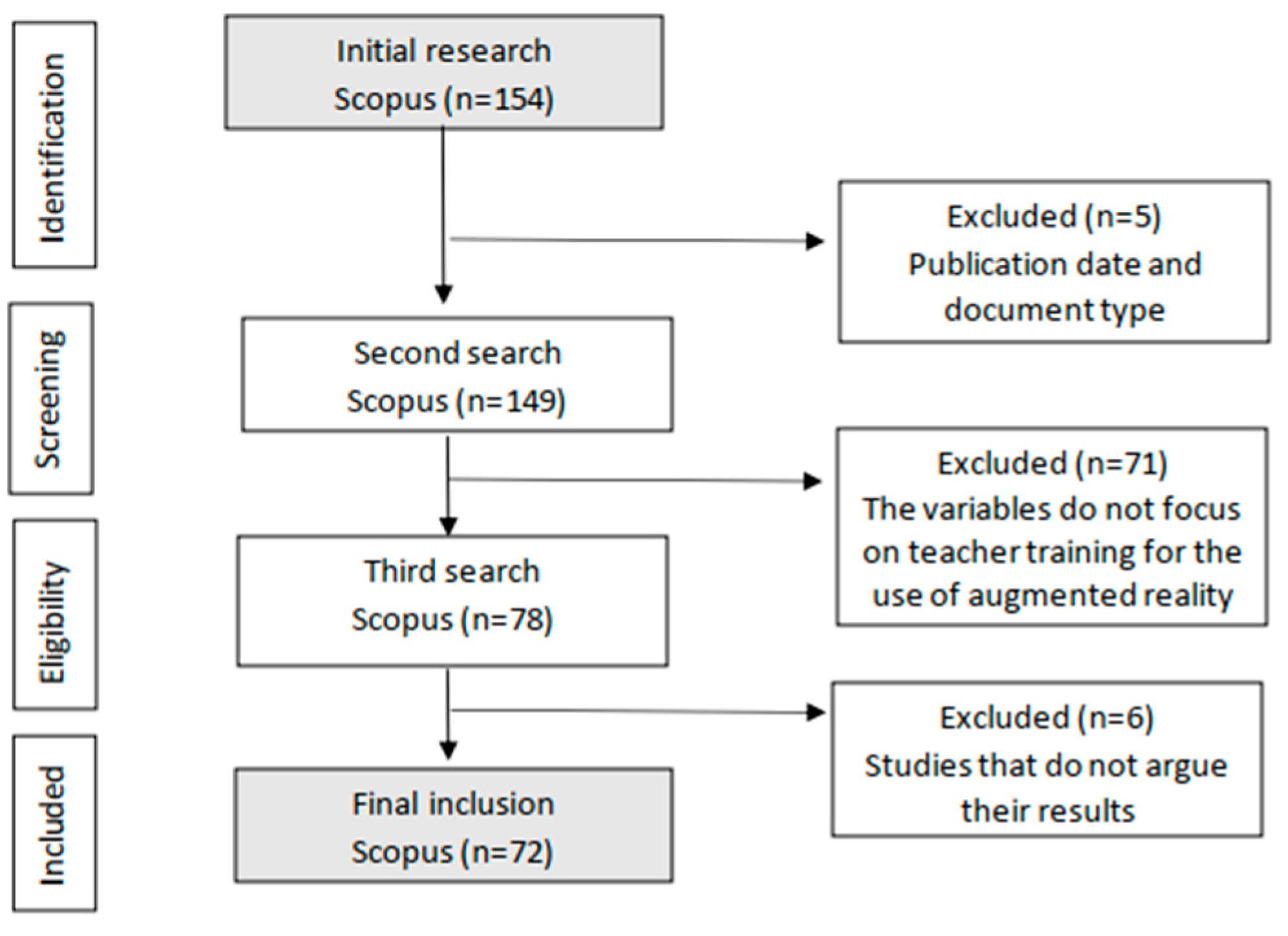
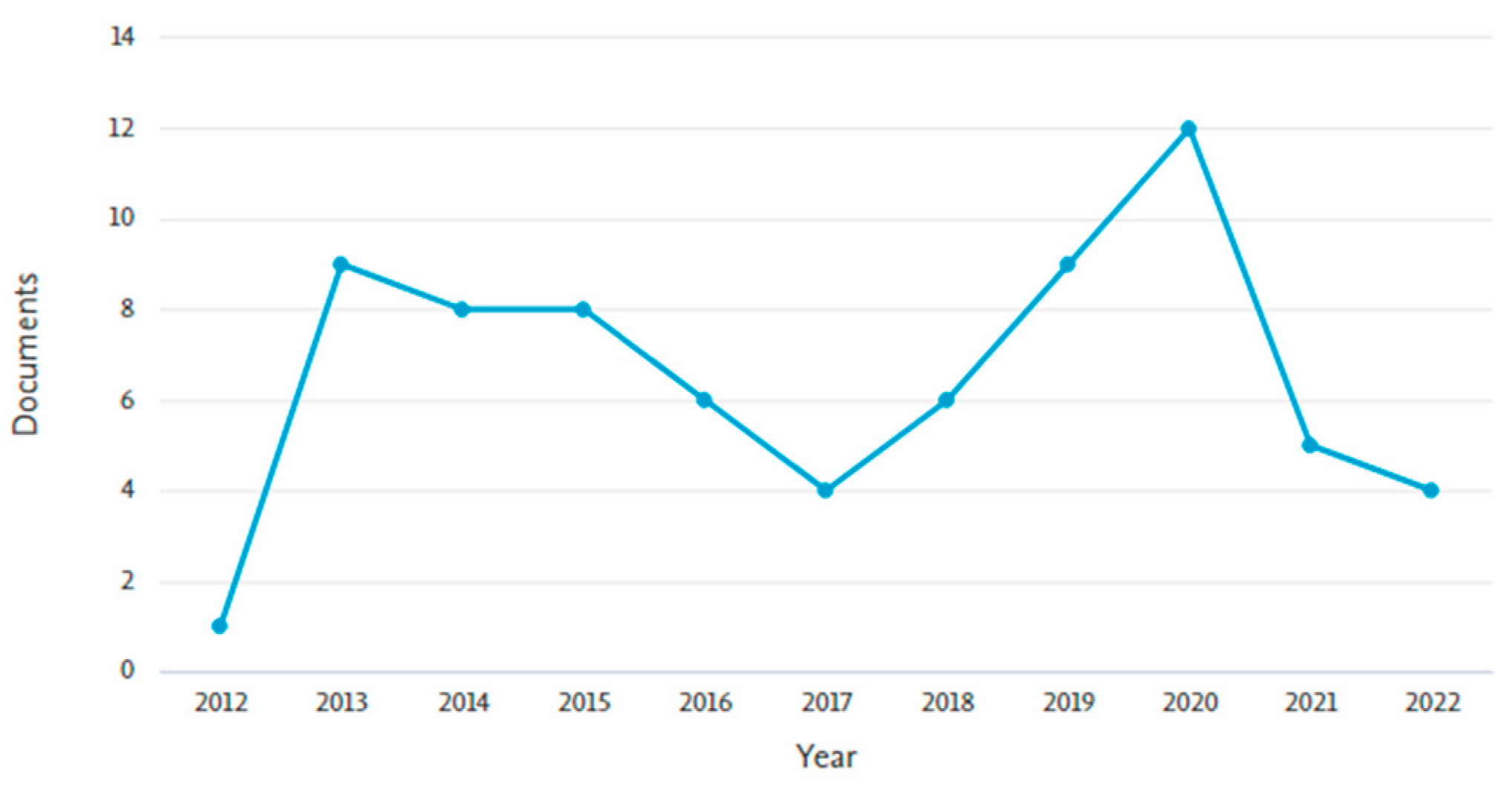
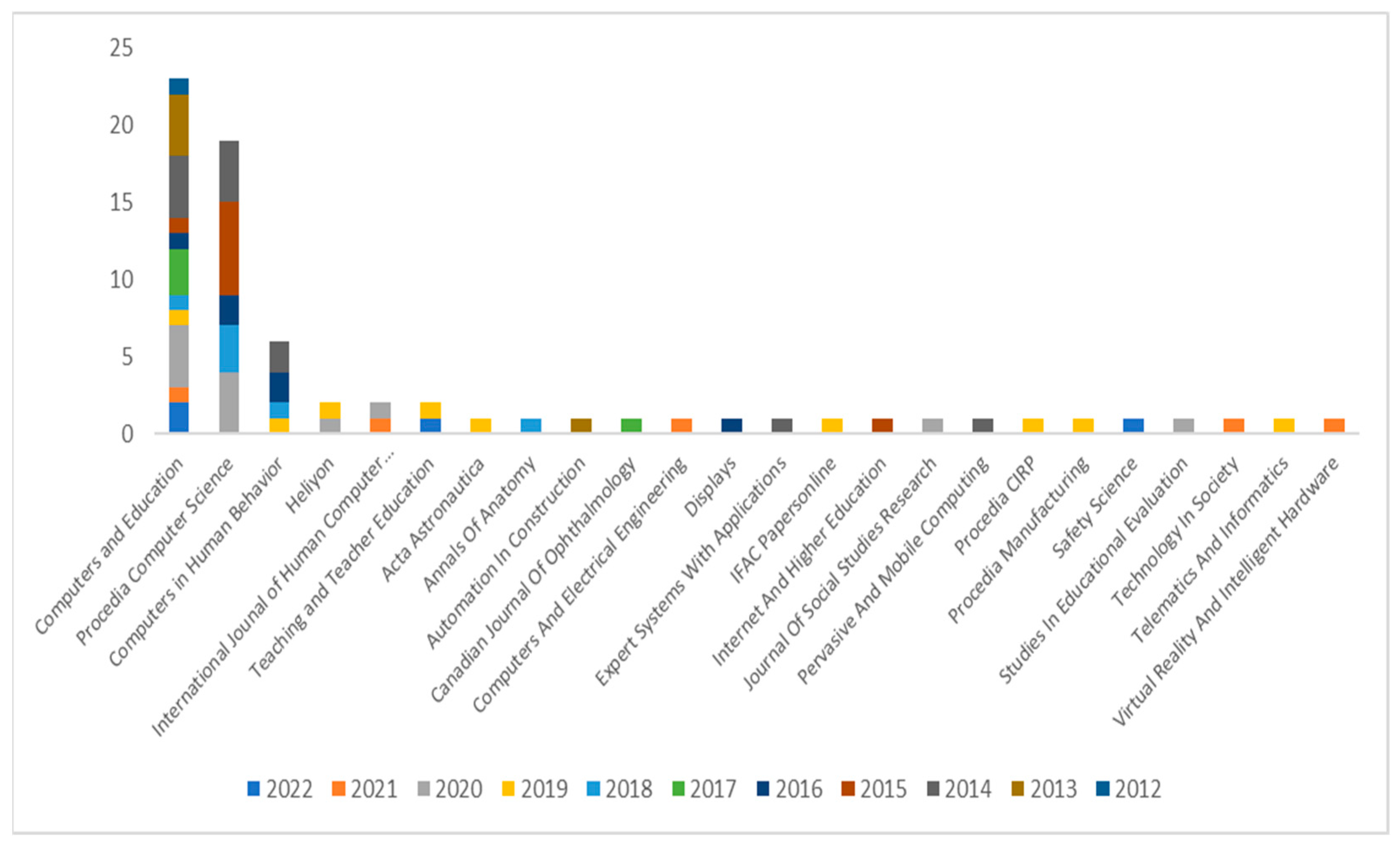
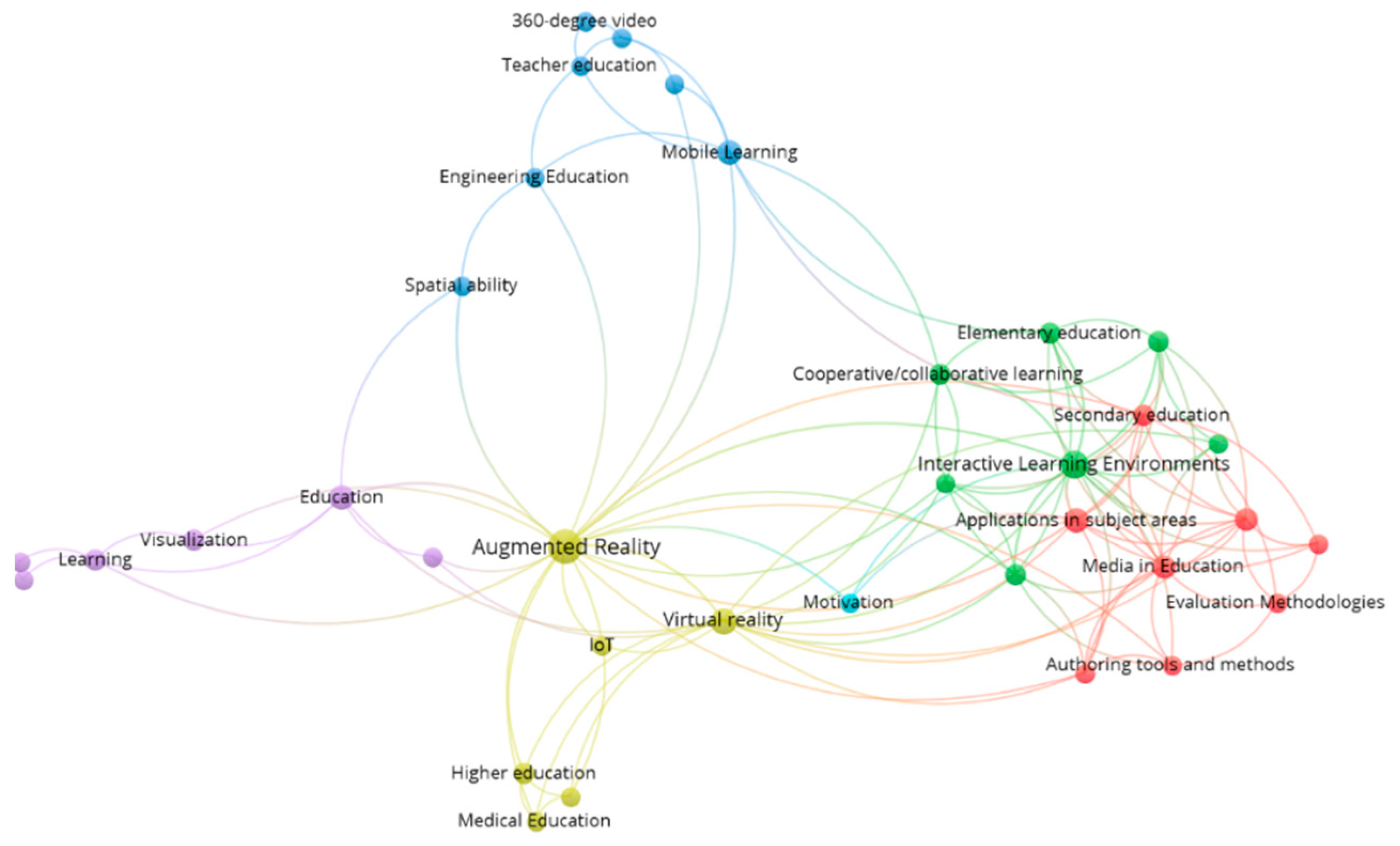
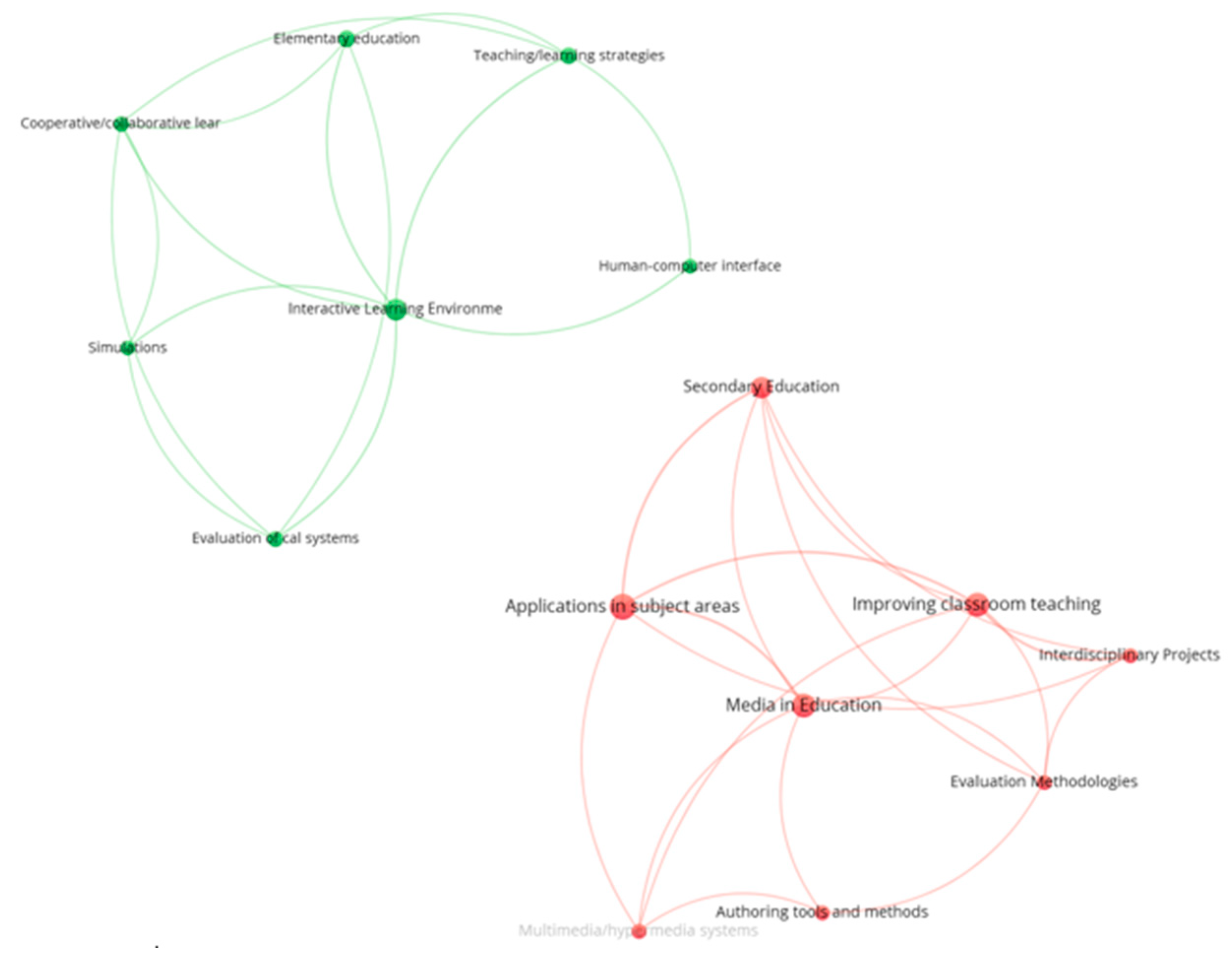
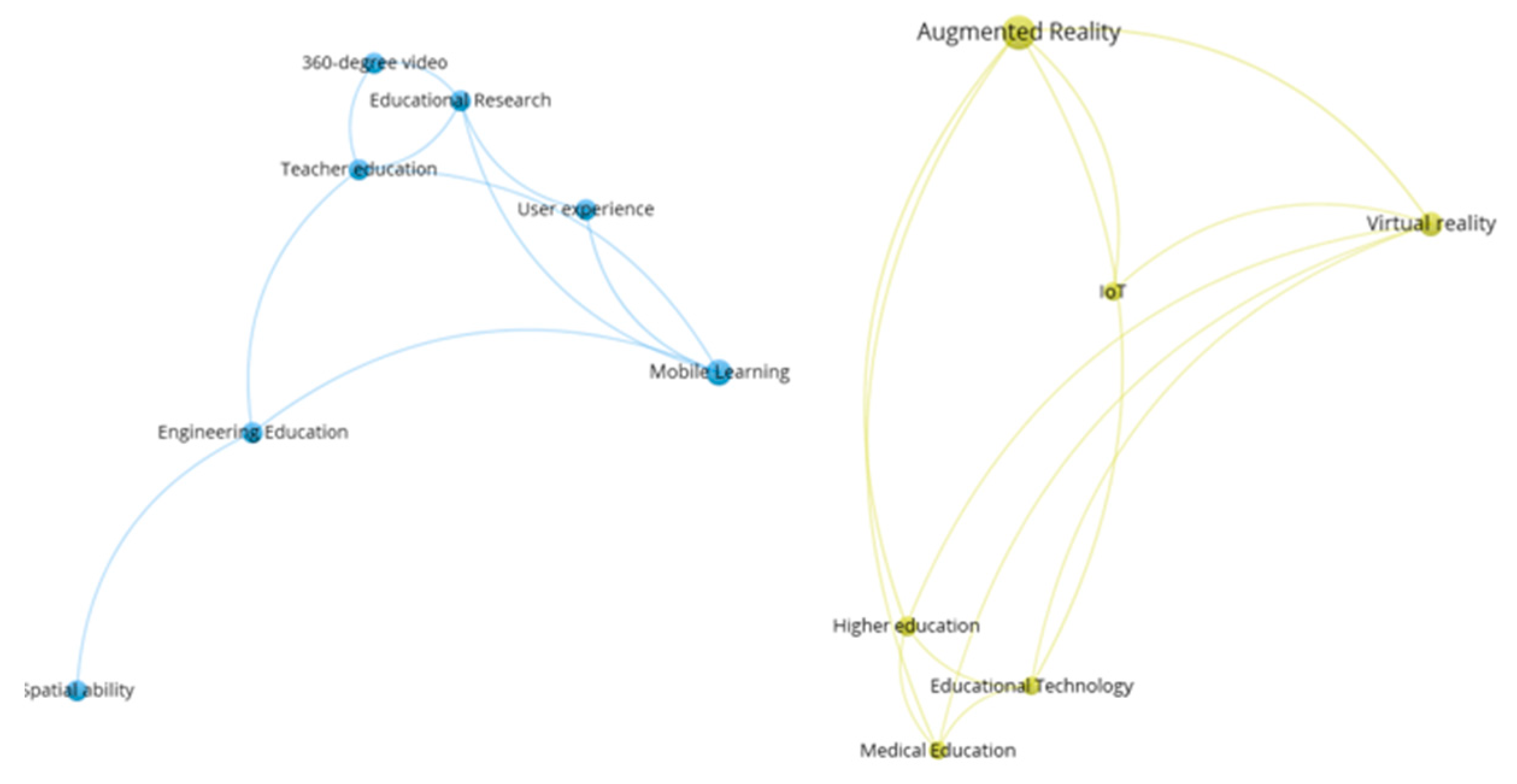

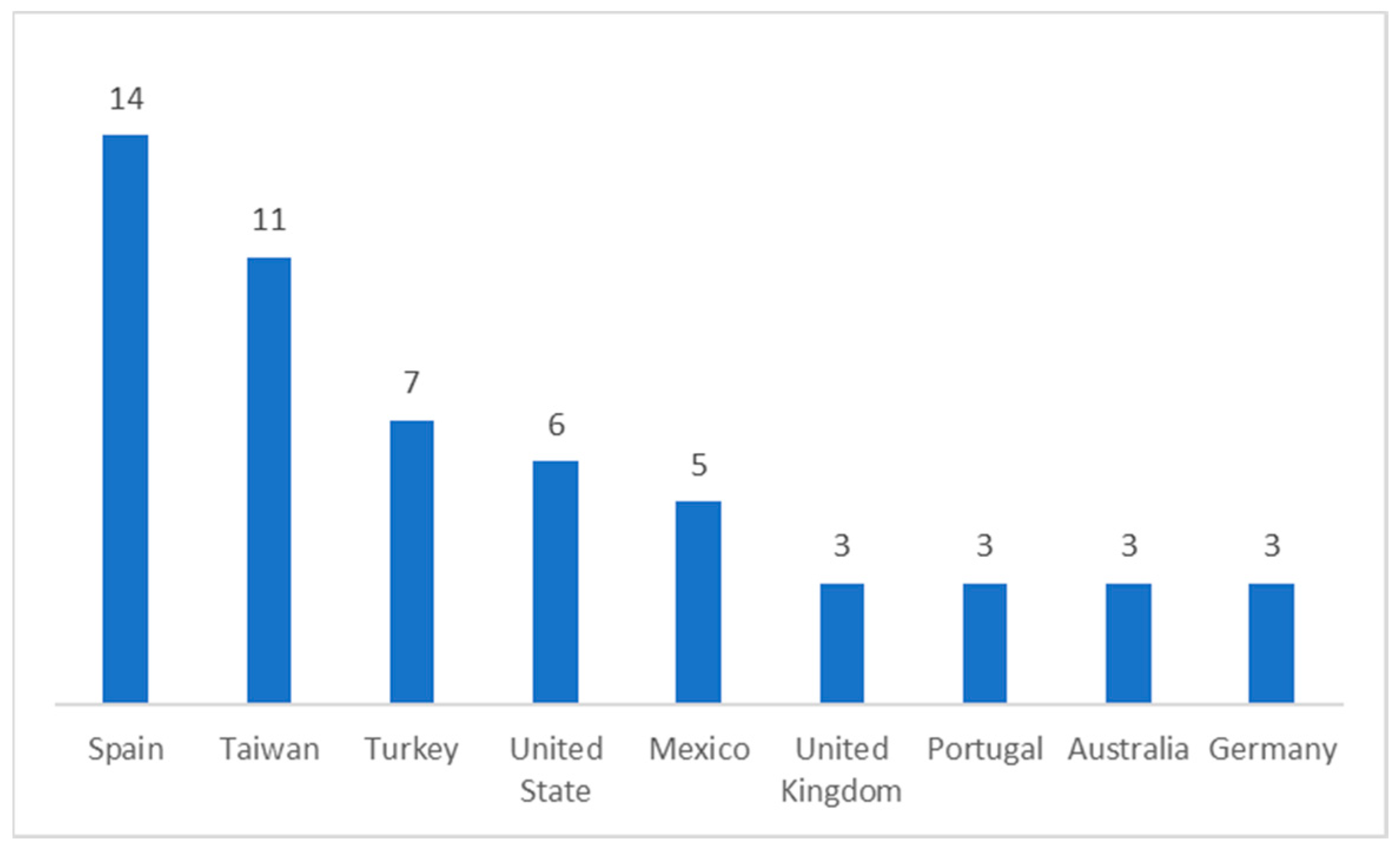
| Based on its physical component | Based on its virtual component | Based on functionality | |
|---|---|---|---|
| Functionality: increased perception |
Functionality: the creation of an artificial environment |
||
| Level 1: black and white pattern (QR codes) | Image | Documented reality and virtuality | To imagine the reality that could be in the future, associating the real with the virtual |
| Level 2: image | 3D |
Reality with augmented perception or comprehension |
|
| Level 3: 3D entity | Video |
Perceptual association of the real and the virtual |
To imagine the reality that was in the past, associating the real with the virtual |
|
Level 4: a point on the planet determined by GPS coordinates |
Audio |
Behavioral association of the real and the virtual |
|
| Level 5: thermal footprint | Multimedia | Substitution of the real by the virtual or virtualized reality | To imagine an impossible reality |
| Keywords | Articles with at least 100 citations |
| Augmented reality (59) |
[41,42,43,44,45,46,47,48,49,50,51,52,53,54,55,56,57] (Chen and Tsai 2012, Kamarainen et al. 2013, Lin et al. 2013, Wojciechowski and Cellary 2013, Di Serio et al. 2013, Cai et al. 2014, Sommerauer and Müller 2014, Zhang et al. 2014, Chiang et al. 2014, Fonseca et al. 2014, Ibáñez et al. 2014, Akçayir et al. 2016, Yilmaz 2016, Huang et al. 2016, Hsu 2017b, Chang and Hwang 2018, Sahin and Yilmaz 2020) |
| Students (32) |
[41,42,43,45,46,47,48,49,51,52,54,55,57] (Chen and Tsai 2012, Lin et al. 2013, Di Serio et al. 2013, Kamarainen et al. 2013, Zhang et al. 2014, Chiang et al. 2014, Fonseca et al. 2014, Ibáñez et al. 2014, Akçayir et al. 2016, Huang et al. 2016, Hsu 2017b, Chang and Hwang 2018, Sahin and Yilmaz 2020) |
| Education (26) |
[47,51,52,54] (Kamarainen et al. 2013, Akçayir et al. 2016, Huang et al. 2016, Hsu 2017b) |
|
Computer-aided instruction (21) |
[41,42,43,46,47,48,50,54,55,56,57] (Chen and Tsai 2012, Di Serio et al. 2013, Lin et al. 2013, Wojciechowski and Cellary 2013, Zhang et al. 2014, Chiang et al. 2014, Ibáñez et al. 2014, Sommerauer and Müller 2014, Huang et al. 2016, Hsu 2017b, Chang and Hwang 2018) |
| Teaching (21) |
[44,46,48,51,58] (Kamarainen et al. 2013, Chiang et al. 2014, Zhang et al. 2014, Yilmaz 2016, Chang et al. 2018) |
| E-Learning (17) |
[55,56] (Chen and Tsai 2012, Sommerauer and Müller 2014) |
| Engineering education (15) |
[52,54] (Akçayir et al. 2016, Huang et al. 2016) |
| Virtual reality (14) |
[49,55,57] (Chen and Tsai 2012, Lin et al. 2013, Sahin and Yilmaz 2020) |
| Interactive learning environments (12) |
[42,43,46,48,50,54,55,57,59] (Chen and Tsai 2012, Lin et al. 2013, Wojciechowski and Cellary 2013, Chiang et al. 2014, Ibáñez et al. 2014, Zhang et al. 2014, Huang et al. 2016, Hsu 2017a, Chang and Hwang 2018) |
| Learning systems (11) |
42,43,46,50,54,55,57] (Chen and Tsai 2012, Lin et al. 2013, Wojciechowski and Cellary 2013, Chiang et al. 2014, Ibáñez et al. 2014, Huang et al. 2016, Chang and Hwang 2018) |
| Quantitative studies | Qualitative studies | Mixed Method | ||||
| Exploratory | Descriptive | Quasi-experimental | Exploratory | Descriptive | Quasi-experimental | Exploratory |
| [50,55,60,61,62,63,64,65,66,67,68,69,70,71,72,73,74,75,76,77,78,79,80,81,82] | [41,83,84] | [43,45,46,47,48,49,52,54,56,57,85,86,87,88,89,90,91,92,93,94,95,96,97,98,99,100,101,102,103,104] | [51,105,106,107,108,109,110,111,112] | [51,53] | [44,113] | [42,114] |
Disclaimer/Publisher’s Note: The statements, opinions and data contained in all publications are solely those of the individual author(s) and contributor(s) and not of MDPI and/or the editor(s). MDPI and/or the editor(s) disclaim responsibility for any injury to people or property resulting from any ideas, methods, instructions or products referred to in the content. |
© 2023 by the authors. Licensee MDPI, Basel, Switzerland. This article is an open access article distributed under the terms and conditions of the Creative Commons Attribution (CC BY) license (http://creativecommons.org/licenses/by/4.0/).





